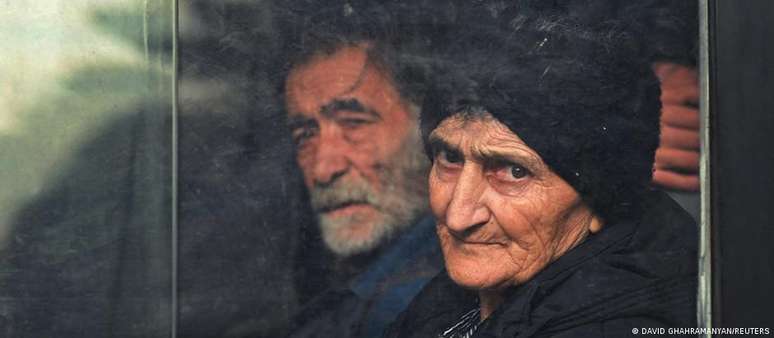The territory disputed by Armenians and Azeris had 120 thousand inhabitants. Most have already sought refuge in Armenia. Humanitarian organizations are asking the international community for help to cope with the exodus: almost 100,000 inhabitants left the enclave of Nagorno-Karabakh, in Azerbaijan, this Friday (29/09), reported the United Nations High Commissioner for refugees (UNHCR), in the aftermath of a meeting of ethnic groups. Armenian leaders have declared the dissolution of the government of the breakaway South Caucasus region.
UNHCR and the Federation of Red Cross and Red Crescent Societies have launched an appeal to the international community for financial help to ensure better reception conditions for refugees.
The United Nations agency said it was ready to help up to 120,000 refugees, which would be the number of inhabitants of Nagorno-Karabakh. This total, however, cannot be confirmed.
The governments of Azerbaijan and Russia – the latter, considered the power protecting Armenia – had declared that it was not necessary for the population to leave the enclave. However, the Armenian-Karabakh population fears persecution and violence from the Azari.
Nagorno-Karabakh’s separatist leadership said Thursday that the self-proclaimed Republic of Artsakh will “cease to exist” on January 1, 2024, after three decades of conflict and tension. The declaration amounted in practice to a formal capitulation to Azerbaijan.
“Ethnic cleansing”
The fact that Armenians are Orthodox Christians and Azaris are Muslims adds a religious dimension to the issues surrounding the enclave. Armenian Prime Minister Nikol Pashinyan accused Azerbaijan of carrying out “ethnic cleansing” on Thursday.
“The analysis of the situation shows that in the coming days there will be no more Armenians in Nagorno-Karabakh,” he noted. The enclave’s human rights commissioner, Gegham Stepanyan, said that at least 200 people had died in the attacks in recent days and that another 400 were injured, according to what was also reported by the Azerbaijani authorities.
For Azerbaijan and its president, Ilham Aliyev, the recapture of the enclave represents a triumphant restoration of sovereignty over an area recognized internationally as part of its territory, but whose ethnic Armenian majority has gained de facto independence in a war in the 90s. it is a defeat and a national tragedy.
Azerbaijan has denied accusations of ethnic cleansing, saying it will not force residents to leave and will peacefully reintegrate the Nagorno-Karabakh region, ensuring the civil rights of Armenians.
Ten-year conflict
Armenians in the region say they don’t trust that promise, pointing to a long history of bloodshed between the two sides, including two wars after the dissolution of the Soviet Union. For days they have been fleeing en masse along the mountainous road that crosses Azerbaijan and connects Nagorno-Karabakh to Armenia.
The region was disputed for decades between the two former Soviet republics. In the 1990s, Nagorno-Karabakh managed to separate from Azerbaijani territory after a civil war in which it received help from Armenia.
In 2020, Azerbaijan, which had strengthened its power at the time thanks to revenues from oil and natural gas exploration, managed to regain much of the enclave, until both sides agreed to a ceasefire negotiated by Russia. In recent years, however, this truce has proven quite vulnerable.
rc/av (DPA, Reuters, ots)
Source: Terra
Rose James is a Gossipify movie and series reviewer known for her in-depth analysis and unique perspective on the latest releases. With a background in film studies, she provides engaging and informative reviews, and keeps readers up to date with industry trends and emerging talents.







